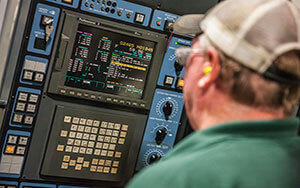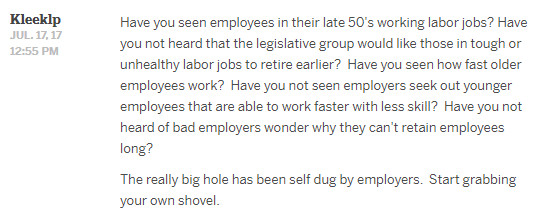Over the next decade, there will be approximately 3.5 million manufacturing job openings in the United States (Deloitte 2017). Predictions are that nearly 2 million will go unfilled.
 As manufacturers, we are already challenged to fill our open positions with skilled employees. To find them now, or in 10 years, we need to continue to be creative and do our part to educate people about what it is like to work in manufacturing today.
As manufacturers, we are already challenged to fill our open positions with skilled employees. To find them now, or in 10 years, we need to continue to be creative and do our part to educate people about what it is like to work in manufacturing today.
Alexandria Industries, for example, was recently approached by a Minneapolis Star Tribune reporter looking for manufacturers who are doing things differently to fill their job openings. We shared an example of a long-term employee reaching the retirement age and how he continues to bring value to our company by working part-time and mentoring junior staff.
When reading the article, however, it became apparent in the readers’ comments that “old school” mindsets of what manufacturing is like today remain prevalent. Some of the common themes that stood out in the comments reflect (mis)perceptions individuals continue to have about what it is like to work in manufacturing—it is low-skilled assembly work, with no training opportunities, and low wages.
While manufacturing jobs have greatly evolved over the last 20 years, it appears that the evolution of innovations in product design and advancements in manufacturing technology may have gone unnoticed to the general population.
Myth: Low-skilled, Assembly Work
As you know, manufacturing is no longer the repetitive, low-skilled, assembly-line work environment more common decades ago. However, some people believe these are still “dead-end” jobs.


The Truth
 Manufacturing today is high-tech, with continuous advancements in electronics and computer programming software. Manufacturers need employees with these high-tech skills to run their CNC machines, design products, engineer innovative manufacturing processes, and much more.
Manufacturing today is high-tech, with continuous advancements in electronics and computer programming software. Manufacturers need employees with these high-tech skills to run their CNC machines, design products, engineer innovative manufacturing processes, and much more.
Many manufacturers offer careers where employees work with the latest machining, robotics and automation technology. In fact, in many factories, employees never touch a product or component, because the machines and robots do all the heavy lifting. It’s up to the workers to ensure these machines are properly programmed and performing as they should.
Myth: No Training Opportunities
With technical manufacturing careers on the rise, it’s difficult to believe that people still think manufacturers offer only low-tech, low-skilled, assembly line work, and do not offer training for their employees to learn and grow their careers.


The Truth
It is true that manufacturers are looking for skilled employees. It is also true that manufacturers hire people with little-to-no experience or education, and start them in entry-level jobs. Progressive manufacturers provide a variety of opportunities for on-the-job, in-house, and off-site training to enable employees to skill-up in manufacturing technology, such as CNC machining, mechatronics, robotics and automation. Some manufacturers also offer full tuition reimbursement for employees who seek technical or post-secondary college degrees, such as in engineering and machine tool technology.
At Alexandria Industries, we offer employees numerous training programs in a variety of areas for every level in our organization. Our training programs – led by both our corporate training manager and corporate trainer – include 5S, Quick Response Manufacturing, machining technology, leadership, and more. We also provide employees full tuition reimbursement for undergraduate and graduate college courses that relate to their work and our business.
Myth: Low Wages
In general, there is a belief that manufacturing jobs are low-paying, compared to other industries. The comments confirmed this and tell us we have more work to do to educate our communities about the valuable, profitable careers available in manufacturing. It also is important to clarify that pay ranges will vary depending on employee skill level, experience, and job knowledge required for specific positions.



The Truth
We clearly have work to do to educate the public about the valuable, innovative, rewarding, and profitable careers available in manufacturing.
According to the Bureau of Economic Analysis and Bureau of Labor Statistics, the average U.S. manufacturing worker in 2015, earned $81,289 annually, including wages and benefits. The average wage for an entry-level machinist, with a two-year machining degree and some experience can earn anywhere between $13 and $26 per hour.
On top of this, the Kaiser Family Foundation states that 92 percent of manufacturing employees were eligible for health insurance benefits in 2015 – the highest of any other industry (NAM.org). With the rising cost of health insurance premiums, this benefit has much greater value than ever before.
Help Wanted
We need your support. As manufacturing companies, and partners, we can work together and learn from each other on ways we can change the misperceptions people have about working in manufacturing. If we do nothing, we may risk losing unfilled jobs to other countries because we will not have enough employees to manufacture innovative products and grow our organization.
Help us spread the word that manufacturing is an industry that fosters growth and promotes employee well-being and pays well. Employees are given countless opportunities to develop and take on engaging, technically challenging work. As in most industries, continuous learning, hard work, and high performance is rewarded with promotional opportunities and higher wages.
We would love to hear your feedback. If you have suggestions or ideas on how to change the misperceptions about working in manufacturing and manufacturing careers, email cfrederick@alexandriaindustries.com.
Stay Tuned
Look for Part 2 of this article in our November newsletter where we will cover specific ways we are working to change the misperceptions about manufacturing careers.
